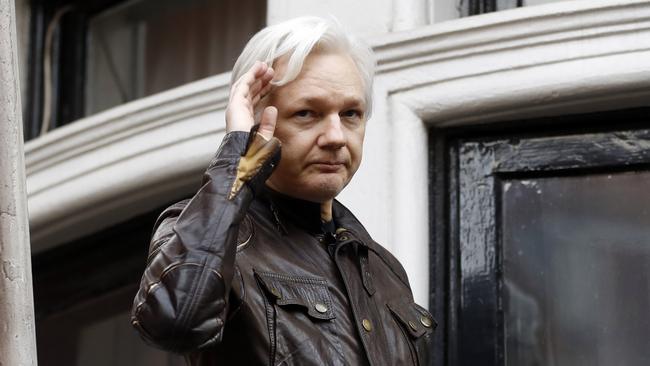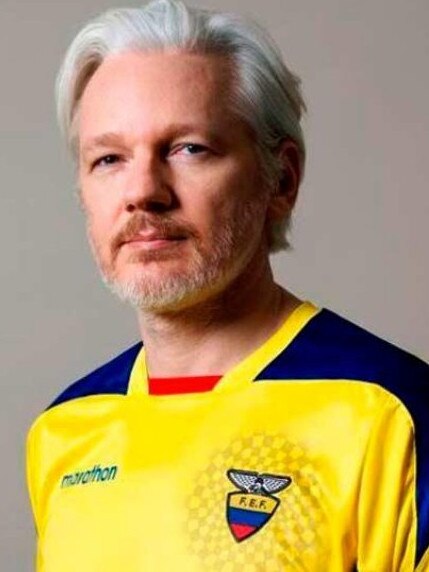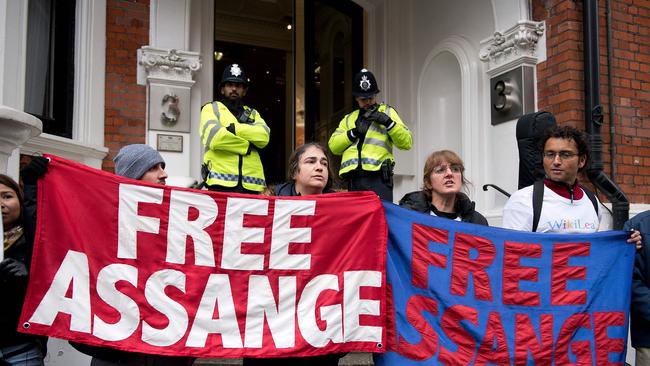Julian Assange faces expulsion from Ecuadorean embassy
Source reveals WikiLeaks founder’s self-imposed incarceration in Ecuadorean embassy is about to end.

Julian Assange faces imminent expulsion after six years at the Ecuadorean embassy in central London, a source close to the case has told The Times.
The latest sign that the WikiLeaks founder’s self-imposed incarceration in a Knightsbridge backroom is grinding to an end came as President Moreno, of Ecuador, said the Australian should go.
One of Mr Assange’s team yesterday said that the crisis had prompted contingency plans for the 47-year-old to leave in “hours, days or weeks”. The assistant criticised Mr Moreno, calling on him to have “more spine”.
Mr Assange took refuge at the embassy in 2012, having lost an appeal against extradition to Sweden for questioning on allegations of rape and sexual assault that went to the Supreme Court.
Mr Assange, whose case has been dropped, is wanted by Scotland Yard for breach of bail. He was granted asylum in 2012 on the grounds that he feared extradition to America, where he faced a possible death sentence or torture.
A source with detailed knowledge of the case said yesterday (Friday): “I expect [Assange] to lose his asylum status imminently. This means he will be expelled from the embassy. When this will happen is impossible to say.”

Mr Moreno said in Madrid on Thursday that nobody should remain in asylum “for too long”. Any change in Mr Assange’s status should be the result of negotiations with all sides, he added.
The president indicated that negotiations with Britain might have resulted in a guarantee that Mr Assange would not face the death penalty if he were extradited. Mr Moreno said: “What we want is for his life not to be in danger.”
Before visiting Spain, the president attended the Global Disability Summit in London this week. It is understood that members of his administration held high-level talks with the UK government to decide Mr Assange’s fate.
The US has repeatedly refused to confirm Mr Assange’s claims that a sealed indictment had been prepared as part of an investigation into his site’s leaks of hundreds of thousands of classified US military documents. Jeff Sessions, the new Attorney-General, has made clear that the administration is seeking his arrest.
A source with knowledge of Mr Assange’s medical conditions said that the recent heatwave would aggravate his health problems. Rumours have abounded about the uncomfortable relationship between embassy staff and the man they call “the guest”.
Sources said that the embassy had no airconditioning and staff used electric fans to keep cool. “The current heatwave would likely exacerbate the already dangerous health situation as a result of confinement for six years without sunlight, exercise and fresh air,” Sondra Crosby, one of Mr Assange’s doctors, said.
Kristinn Hrafnsson, a spokesman for WikiLeaks, said that Mr Moreno faced “reputational damage”. Mr Assange and his team were being kept in the dark about negotiations between Britain and Ecuador. He said: “It’s hugely disappointing that there’s not more spin in this president.”
Mr Assange’s lawyer in London, said she met him on Tuesday evening and remained concerned for his health.
Jennifer Robinson said: “It’s an untenable situation. He’s under a huge amount of pressure. If they do remove his protection, we will go to the courts to protect him.
“We are preparing to defend him in the British courts and will fight extradition to the US. We don’t have any indication of time frame. This is a very serious situation, one that we are very concerned about. It’s a matter for Ecuador, the UK, the US and Australia.”
-

ANALYSIS
By John Simpson and Boer Deng
Should he leave the embassy in the coming days, Julian Assange’s long-held belief that US authorities are waiting to pounce will finally be put to the test.
Since an extradition request from Sweden in 2010 — following allegations of sexual assault made by two women — he has claimed that the US intends to further extradite him.
The WikiLeaks founder, whose followers have alleged that the women were part of an elaborate CIA honeytrap, secured political asylum at the Ecuadorean embassy on the grounds that he faced the prospect of torture or even the death penalty should he be sent to the US to be tried for espionage and sedition.
Initial expectations that the new White House administration would reward the publication of leaks that swayed the election in favour of President Trump have evaporated. As presidential candidate, Mr Trump praised WikiLeaks for publishing information hacked from Hillary Clinton’s private email server.
Since he took office, however, Mr Trump’s enthusiasm for leaks has waned. The steady drip of secrets spilling from his White House has led to furious denunciations of whistleblowers.
Since last year, the Justice Department has been deep in discussion over the range of charges Mr Assange could face for publishing millions of sensitive, secret or embarrassing US government documents through WikiLeaks over the past decade.
Ecuador has said that his extradition to the US would rest on assurances that Mr Assange would not face capital punishment, and prosecutors are said to be sceptical that espionage would be the most successful course to pursue. Lesser charges of theft of government documents are possible, as are those against unlawful transmission of classified data.
US intelligence services concluded that WikiLeaks had helped the Russians interfere in the 2016 election. In May, Mr Assange said he would be willing to speak to Congress regarding the election meddling. His offer was not taken up.
THE TIMES



To join the conversation, please log in. Don't have an account? Register
Join the conversation, you are commenting as Logout